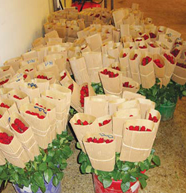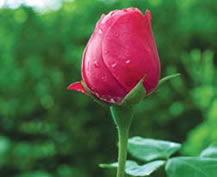Industry Briefs

Oserian Flower Introduces Music School
As the Kenyan government introduces a new curriculum in the country’s education sector focusing more on talent development than academic pursuit, flower grower and exporter Oserian Development Company has introduced a music school at its supported educational institutions. Speaking at the unveiling of the farm’s music instruments, Head of Administration Kirimi Mpungu said it is important to develop talent alongside academic grades to create a rounded individual as well as avail past time activities that are helpful in living a healthy life as per the farm’s overriding Flori4Life slogan.
The tagline captures Oserian’s four main development lines – Flori4Water, Flori4Food, Flori4Schools and Flori4Nature. These show the community support focus programmes for education, water, food security and environment for sustainability of life. Each is aligned to the world’s Sustainable Development Goals (SDGs). Under SDGs No 4, Quality Education: Providing equal access to affordable vocational training and to eliminate gender and wealth disparities with the aim of achieving universal access to a quality higher education, Oserian Flowers has built seven schools running from daycare to secondary schools within its expansive farm to cater for staff children and the community. The music school is open to all interested in the art.
Kakuzi Farmers Day Exposes A Lucrative Window In Avocado Farming In Kenya
Kakuzi, the largest buyer and exporter of the Hass and Fuerte varieties of avocado in Kenya, held its annual Avocado Small Holders Field Day yesterday, 08/12/17.
The event which was attended by the Murang’a County Governor Mwangi Wa Iria, is the company’s passionate initiative aimed at educating, supporting and promoting increased productivity of avocado by Kenyan farmers.
“Kakuzi is passionate about addressing social issues, in order to contribute to the creation of a sustainable society and provide the opportunity for development for all. The welfare of Kakuzi’s employees and of the surrounding communities is therefore at the core if its operations.”
The event brought together hundreds of farmers mainly drawn from the surrounding Murang’a and Nyeri counties. This annual event is only a part of the various education and training programmes conducted by the company for the benefit of smallholder farmer.
In the event, attending farmers got a wealth of information from experienced Kakuzi managers and skilled local farmers. The stands mainly included workshops on avocado husbandry, but also offered training on macadamia husbandry for the local farmers who are unable to grow avocados due to their soil ecology.
Event Highlights
Very interesting facts came out during this training. Aspiring farmers should know the following:
- Kakuzi buys Hass Avocado at between Ksh 19 and 35 per piece depending on size. Now that is a high giving farmers a potential income of Ksh.1.5 million per acre on average.
- In addition to the buying price, farmers supplying the company get an annual bonus at the end of every year. The best smallholder farmer last year got a cheque of Ksh.300,000.
- The fruit has a limitless market in Europe and we just can’t satisfy it. The majority of the Hass exports (70%) are to France, while 15% goes to the UK with the balance distributed through other EU countries, Switzerland and Scandinavia.
- Avocado is the best paying fruit among the fruits sold overseas therefore presenting a sustainable high profit venture for Kenyan farmers.
Uganda: Rosebud dominates flower exports  When Zimbabwe crumbled and halted dominating the export of flowers to Europe, Rosebud, Uganda’s largest exporter of roses commanding around 35% of Uganda’s rose-export market, popped out to fill the gaps, according to East African Business Week.
When Zimbabwe crumbled and halted dominating the export of flowers to Europe, Rosebud, Uganda’s largest exporter of roses commanding around 35% of Uganda’s rose-export market, popped out to fill the gaps, according to East African Business Week.
“Rosebud has a high regard for quality which has reinforced the company as the major resort in the Ugandan market for buyers across the world,” says director Meera Ruparelia. “The greenhouses cover a total of 42 hectares producing and exporting over 9 million stems per month.”
Equipped with state of the art equipment and employing highly skilled staff, the roses produced are given the attention a surgeon gives a patient on the operation table.
Quality is priority to satisfy the sophisticated Western world. They serve large and small orders in a time.
“We produce a wide variety of flowers comprising: Red Calypso (bright red), Viva (bright yellow), Valentino (dark red), Chelsea (orange), Akito (white), Marie Claire (orange flame), Blushing Akito (pink), Poeme (pink), Meera (champagne), Lambada (orange) and Samoa (deep orange).”
Commanding 40 % of the roses export, the company based in Entebbe, remains the country’s largest exporter of the product. The green houses on the farm covers a total of 50 hectares producing and exporting over 12 million stems per month. These stems, due to the favorable weather conditions experienced throughout the year, result in their being of the desired standard.
Zambia: Airline relaunch expected to revive flower industry
Transport and Communications Minister Brian Mushimba has assured that the Zambian government will not interfere in the running of Zambia Airways.
 In an interview in Lusaka, Mr Mushimba said government will stay off clear from the day to day running of the national carrier. Mr Mushimba said the bringing of Ethiopian Airlines as an equity partner will further guarantee independence in the running of Zambia Airways.
In an interview in Lusaka, Mr Mushimba said government will stay off clear from the day to day running of the national carrier. Mr Mushimba said the bringing of Ethiopian Airlines as an equity partner will further guarantee independence in the running of Zambia Airways.
Mushimba: “We see the larger picture,there is the domino effect of setting up the airline because it will grow certain industries like tourism, agriculture and horticulture. Remember, we used to have a flower industry here and it died with the death of Zambia Airways. You can’t export your flowers through Kenya Airways which stops three, four times before getting to Europe because your flower will die.”
